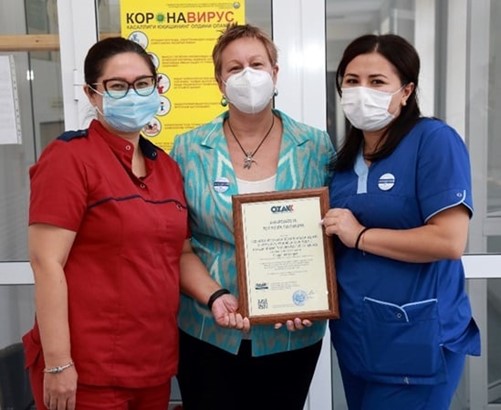Well-functioning and sustainable laboratory services that adhere to international standards of quality and safety are essential for strong health systems and are crucial to improving public health. In Uzbekistan, the World Health Organization’s (WHO) Better Labs for Better Health (Better Labs) initiative was deployed to tackle the issue of public laboratories, particularly those in rural areas, not being able to provide quality services for the detection, assessment, response, notification and monitoring of health threats. This initiative has had a positive impact on the quality and safety of laboratory services in the country, enabling them to provide reliable and timely results, and strengthening the public health system's capacity to comply with International Health Regulations. The investment in laboratory services saw great success in 2020, with the national reference centre for antimicrobial resistance (AMR) becoming the first laboratory to be accredited ISO-15189, the international standard specifying requirements for the quality and competence of medical laboratories.
Key WHO Contributions
Developing a national laboratory policy, strategic and operational plans
Establishing guidelines to facilitate reforms and identifying key structures and processes to define a working national laboratory system
Training national laboratory working groups and laboratory managers
Providing WHO-trained mentors to enable continuous improvement and preparation for ISO-15189 accreditation.
How did Uzbekistan, with the support of the WHO Secretariat, achieve this?
WHO Uzbekistan provided technical support to the Government of Uzbekistan for strengthening of the national laboratory system. This included developing a national laboratory policy, strategic and operational plans, and guidelines to facilitate reforms. With an overarching framework in place, WHO Uzbekistan then worked closely with the Ministry of Health and National Committee for Laboratory and Epidemiological Surveillance to establish the key structures and processes that would be necessary for a successful national laboratory system, such as standardized assessment, costing of laboratory expenses and tests, and a laboratory quality management system.
In order to strengthen laboratory capacity, Better Labs organized training courses for National Laboratory Working Groups and laboratory managers. These training sessions focused on topics such as laboratory quality management, sample and waste management, biosafety and biosecurity. Additionally, laboratory managers from central and regional labs were trained on WHO’s Laboratory Quality Stepwise Implementation (LQSI) tool, which provides a step-by-step plan to help laboratories implement a Lab Quality Management System (LQMS) that meets international standard ISO-15189.

The Centre for Antimicrobial Resistance (AMR Centre) in Tashkent receives ISO-15189 accreditation from the National Accreditation Centre of Uzbekistan.
Photo credit: WHO Uzbekistan.
To enable continuous improvement and preparation for ISO-15189 accreditation, from 2016 the Better Labs initiative seconded international quality management officers from ISO-15189 accredited laboratories in Eastern Europe and Central Asia. The country’s national reference laboratory, the Antimicrobial Resistance (AMR) Centre, joined the programme in 2018. In the course of their in-country visits, the WHO-trained mentors responded to queries, created action plans, conducted external audits and delivered training. Regular communication helped develop staff competencies in national laboratories and ensured that plans were followed up. As a result of these efforts, the AMR Centre became the first laboratory in Uzbekistan to receive ISO-15189 accreditation from the National Accreditation Centre of Uzbekistan, a member of the International Laboratory Accreditation Cooperation (ILAC).
“The mentoring program for AMR Centre was timely. Thanks to the competent assistance of WHO experts during mentoring visits, the quality of microbiology diagnostics has improved at the AMR Centre. The introduction of a quality management system in medical laboratories means the delivery of high-quality services to the public. This is the motto of the AMR Centre's team.”
- Dr Gulnora Abdukhalilova, head of the AMR Centre
The AMR Centre is now responsible for diagnosing, identifying and tracking the emergence of drug-resistant bacteria, and is a key player in training laboratories and sustaining the surveillance network in Uzbekistan. This accreditation demonstrates the success of the Better Labs initiative in improving the quality and safety of laboratory services in Uzbekistan, thereby strengthening the country’s overall public health system.
“Better Labs AMR Mentoring has been helping us to maintain standards of diagnostics and treatment of severe cases referred/coming from our provinces. There has been a considerable improvement in our seamless interaction/collaboration with the laboratory. We were able to achieve even better treatment outcomes for our patients. Previously, hospital stays were as long as 15-20 days and now, because quality of [laboratory test] results has improved, we have succeeded in ensuring that patients receive treatment for 7-8 days and are then discharged in better health condition”
- Boltaeva Manzura Nishanovana, Head of the Department of Pathology of Young Children, Republican Specialized Scientific Practical Medical Centre of Pediatrics of Uzbekistan
WHO Regional Office, WHO Uzbekistan, and mentors achieved a major milestone in the successful implementation of a laboratory quality management system. This achievement is a testament to the effectiveness of WHO’s mentoring approach to support the improvement of laboratory services. The success of the Better Labs mentoring programme has resulted in the creation of other national mentoring programmes in Uzbekistan to improve public health, antimicrobial resistance (AMR) and clinical diagnostic laboratories. For instance, the WHO-supported proof-of-principle (PoP) AMR routine diagnostics surveillance project used mentoring to improve AMR surveillance and patient treatment through rapid and reliable tests. The establishment of national mentoring programmes serves as a model for other countries to follow in order to improve laboratory quality management and AMR surveillance, ultimately leading to better patient treatment and care.

